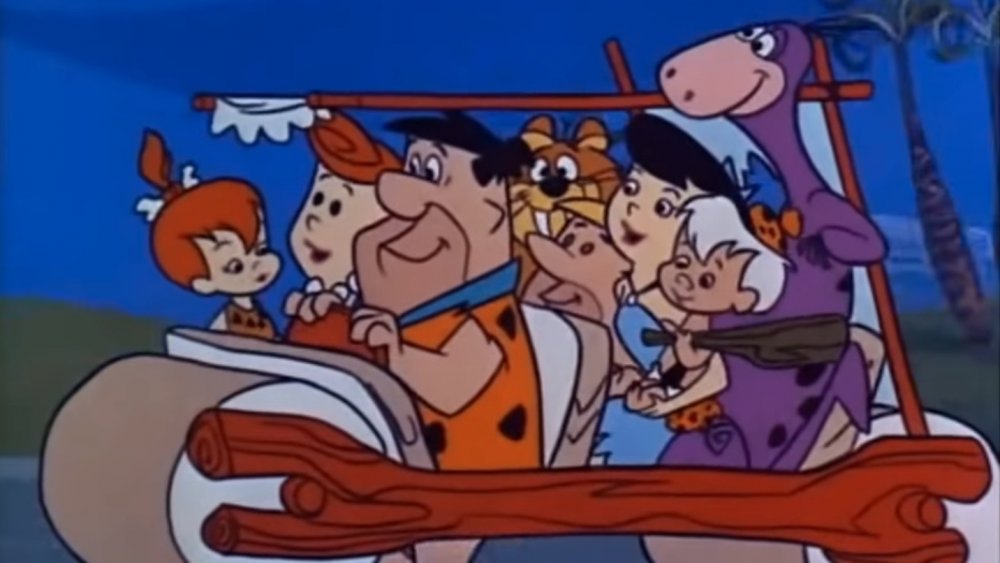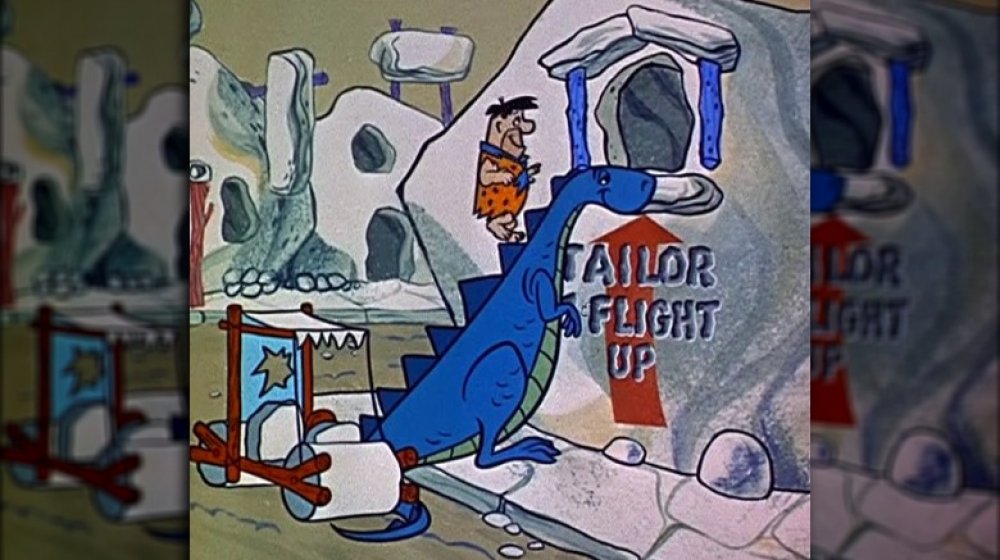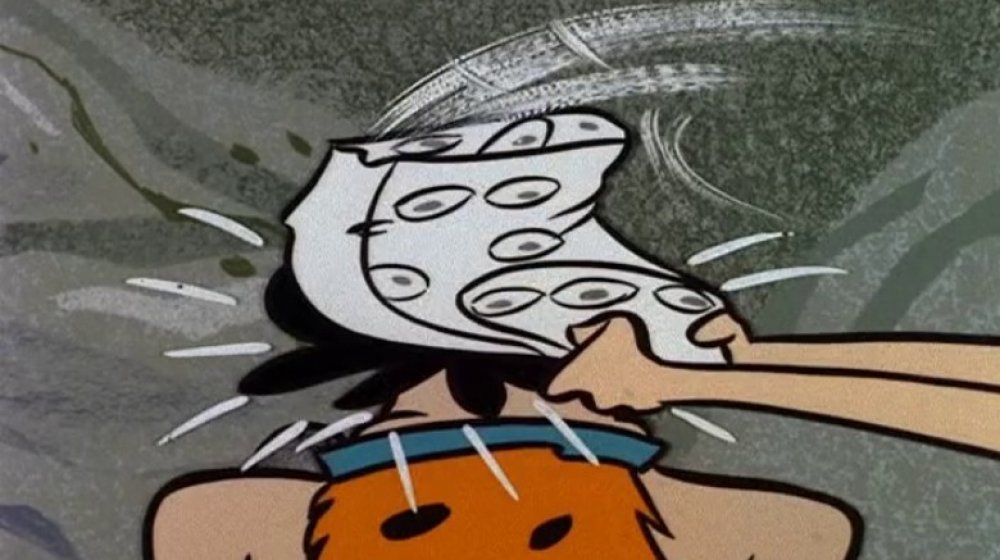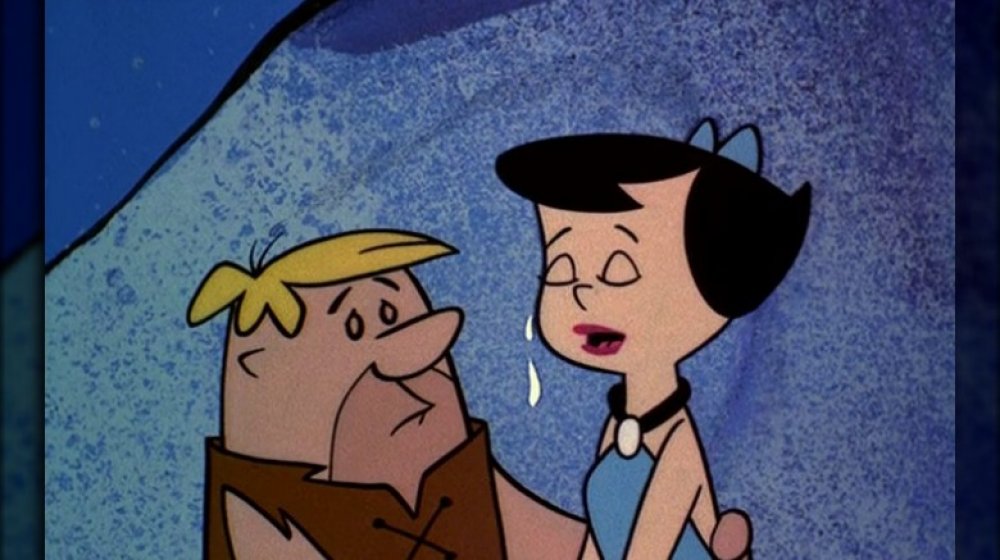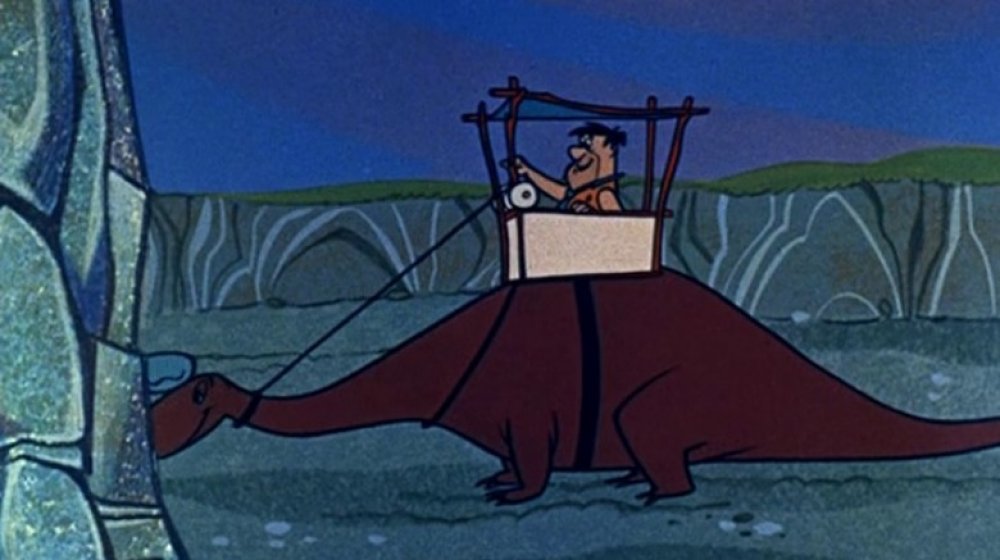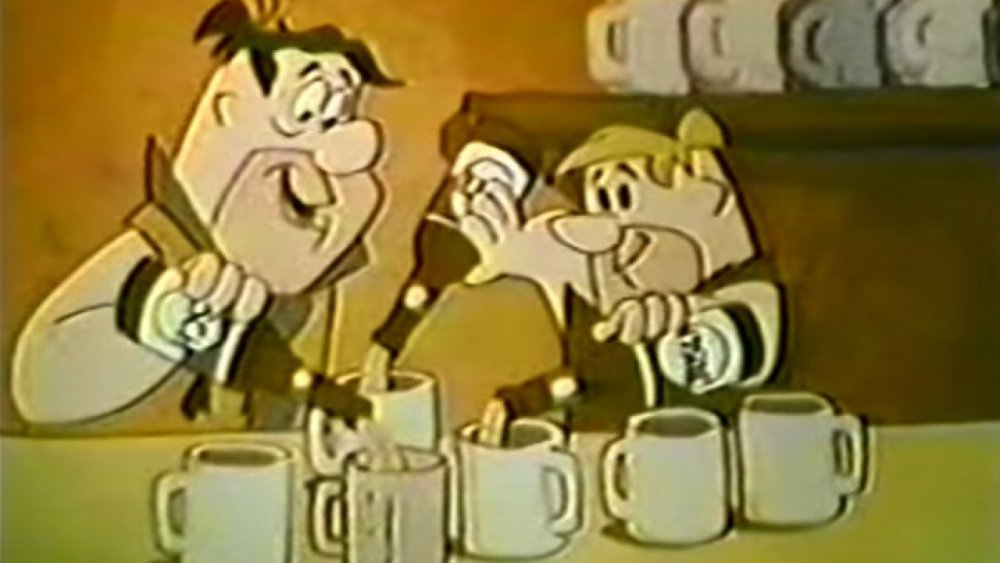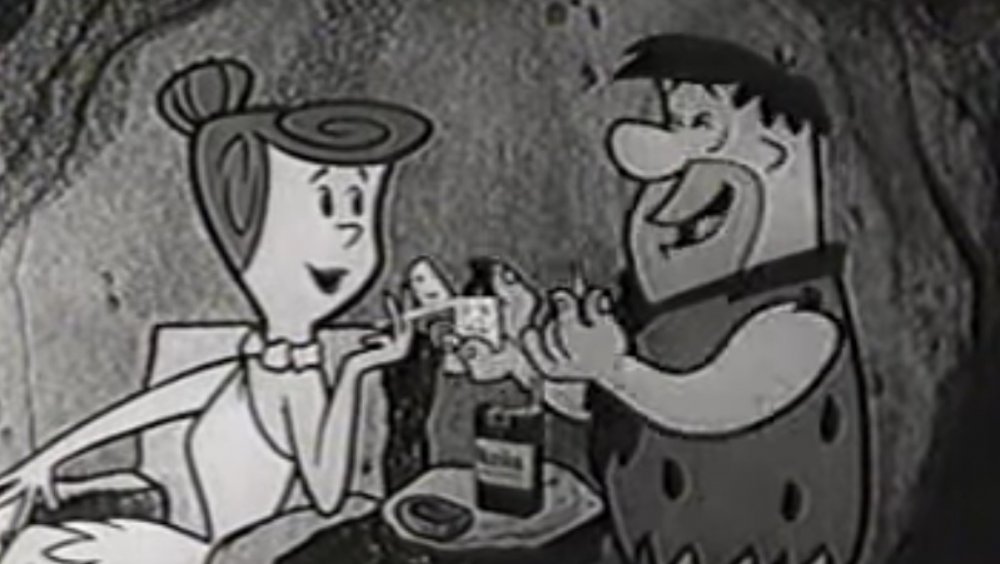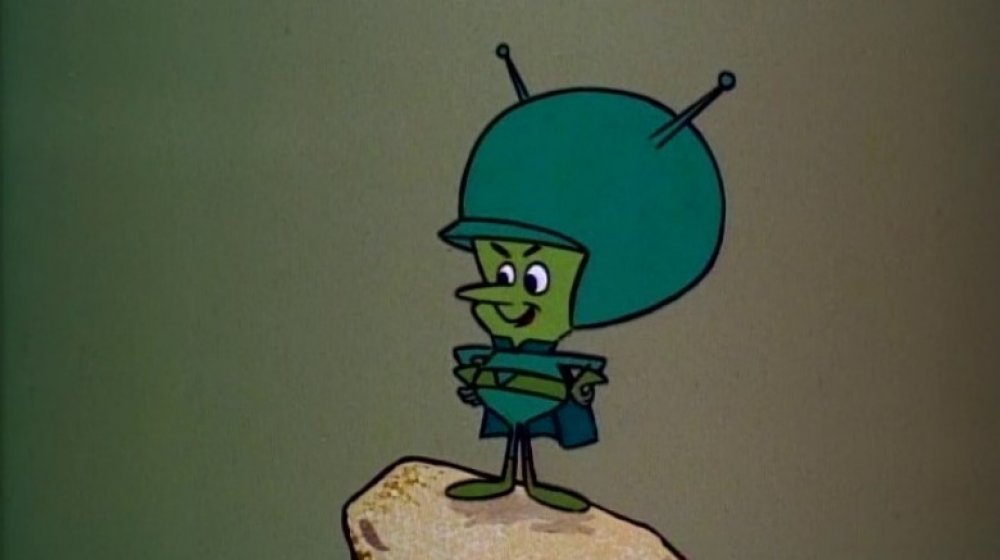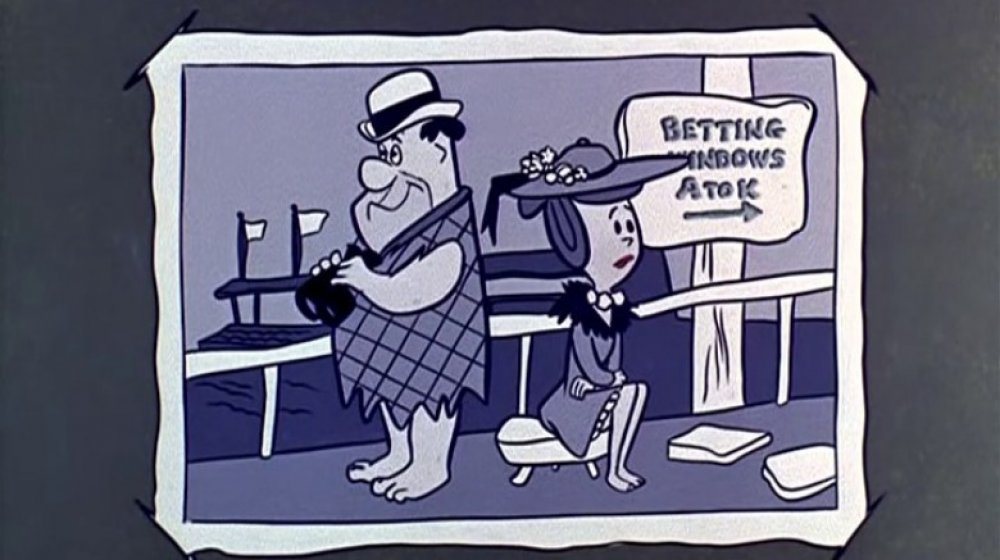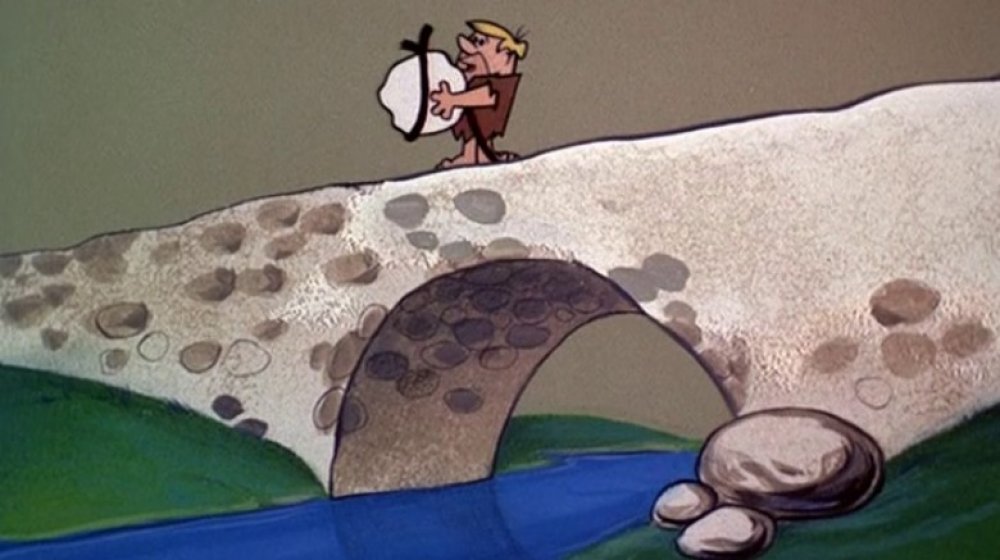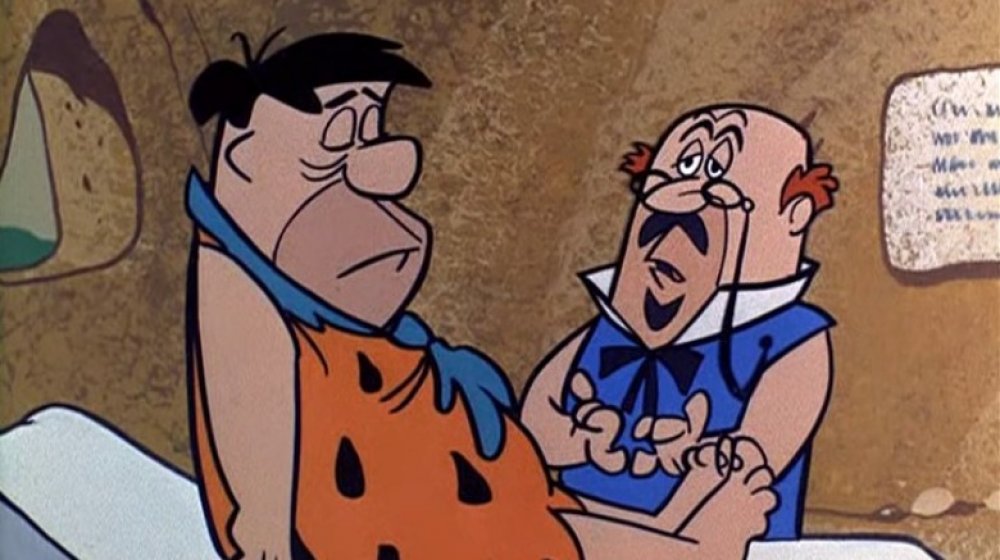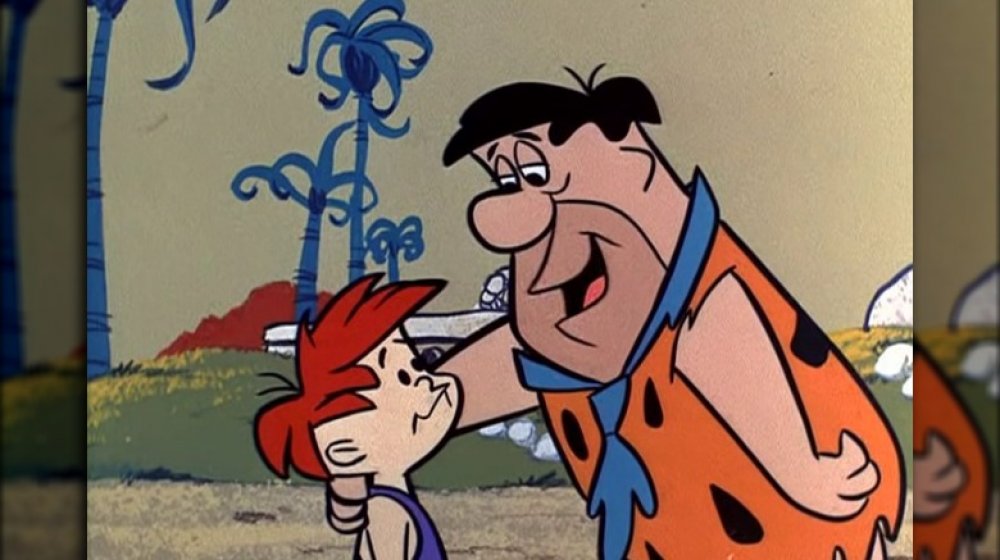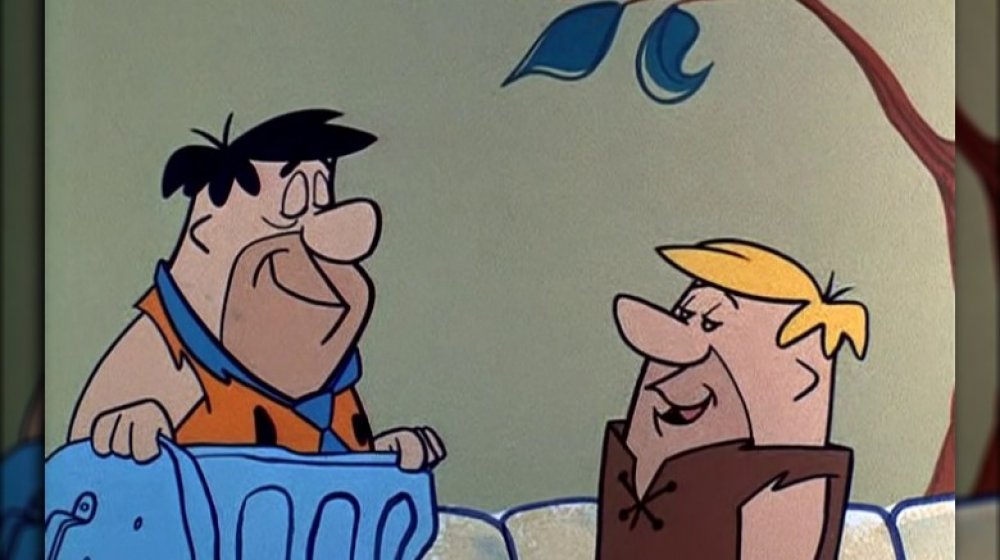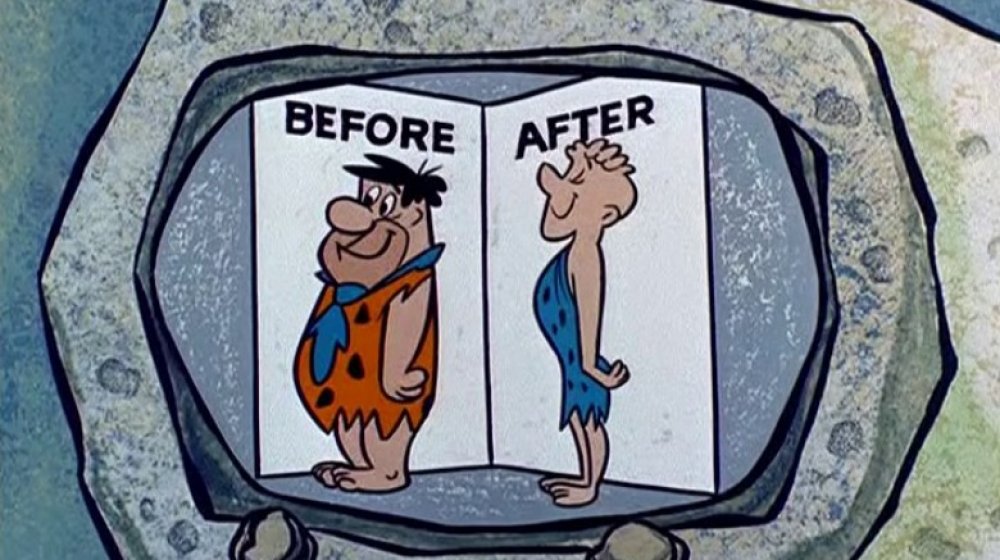The Dark Parts Of The Flintstones Went Over Your Head As A Kid
Flintstones, meet the Flintstones. They're the original animated sitcom family brought to us by William Hanna and Joseph Barbera in 1960. Up until The Simpsons came about, The Flintstones was the longest-running animated prime-time show, providing original content for nearly six years. This Stone Age version of The Honeymooners had a lot going for it. The series was a hit with viewers, and it introduced a new style of animation that allowed episodes to be produced quickly and consistently. The show relied more on jokes, dialogue, and story than animation quality. The Hanna-Barbera genius that brought the world hilarious shows like Tom and Jerry and Scooby-Doo created a lasting legacy for the Flintstones that would be cemented in merchandise, advertisements, and vitamins up through the modern day.
The Flintstones was directed toward children, but you can find adult humor throughout the series. Same goes for the live-action movie. (Technically, there were two, but only one of them was any good.) The Flintstones did more to appeal to adults than you probably realized as a child. There are dark themes woven throughout the franchise that a child's less jaded eyes would struggle to identify, but they're there. Oh, they're there.
The world of the Flintstones exploited animals to an unprecedented level
In the Flintstones' fictional Stone Age world, there isn't much in the way of modern appliances or conveniences, but the show does a great and humorous job of making the world as modern as possible with the limited technology available. The cars are famously powered by the driver's feet, making driving to the grocery store a strenuous and highly unsafe event. Houses are made of cut stone. Paper is replaced with stone tablets. They even have cameras, ice boxes, and bowling alleys. The world is a technological dream to our ancestors with sharpened rocks and rudimentary fire-making skills that defined the Paleolithic period.
How does Hanna-Barbera's prehistoric world manage to dip its toes into the waters of modern-day technology? Exploitation. Pick any episode, and you'll see it. Animal exploitation is one of the major themes of the show from start to finish. Stegosaurs are driven as fire trucks. In the episode "Fred's Monkeyshines," we see a little bird chipping stone Polaroids inside of his camera. In "Ladies' Night at the Lodge," a dinosaur under the sink is used as a garbage disposal, while the trunk of a mammoth is run through the wall as a mammalian faucet. A trope within the show portrays these animals complaining about their unfair treatment. Not only are they exploited, but they're intelligent enough to know it.
Domestic abuse is played for laughs
Whereas domestic abuse isn't a laughing matter in the real world, children are goblins who find humor in the mistreatment of cartoon characters as long as there's an interesting "boing," "bing," or "bang" to go along with it. The Flintstones uses this dark theme as a point of humor within the show. It happens multiple times in the first episode alone. Wilma, Fred's stereotypical '60's TV housewife, whacks him on the head when she discovers him at the bowling alley, only to realize that the person she hit wasn't Fred. Well, it was, but the fake mustache really threw her off. Later on, when she realizes for sure that it was him at the bowling alley, we hear Fred screaming, "No! Not in the head!" right before a crashing sound.
In the real world, men account for the majority of domestic violence, but the world of The Flintstones turns this around. Fred may threaten something along the lines of, "Oh, you'll be sorry," but Wilma perpetrates the majority of the physical abuse. She's always dropping bowling balls on his feet or whacking him over his overgrown Neanderthal cranium. It's an interesting message to send in a children's cartoon.
Barney and Betty are infertile
This theme isn't only dark — it's relatively sad. Plenty of would-be parents out there understand the pain that Barney and Betty went through for the first few seasons of The Flintstones. They tried to have a baby of their own, but their little cartoon bodies weren't cut out for it. Their childbearing fate was in the hands of the gods, William Hanna and Joseph Barbera. So while the gods were deciding their future in the writing room, the Rubbles would spend their time moping about their biological inabilities or playing with Pebbles once she was introduced to the show in "The Blessed Event."
Hanna-Barbera were merciful gods, and the Rubbles wouldn't have to suffer forever, only for the first three seasons. In season four, specifically the episode titled "Little Bamm-Bamm," Betty and Barney's prayers would be answered after the couple implored their creators to grant them the slightest mercy in a last-ditch effort: They wished upon a falling star. Apparently, that's what it takes to sway Hanna-Barbera. Later in that episode, little Bamm-Bamm was left on their doorstep, and the Rubbles started their arduous journey through parenthood.
Fred and Barney are stuck in dead-end jobs
A dark reality is one where you strive to better your life but can't gain an inch. Unfortunately, it happens to living people all the time. They work in the same factory their entire life instead of climbing the corporate ladder, the American dream. The Flintstones' world doesn't differ from ours in that respect. Of course, their existence was episodic, so they couldn't drastically change things for good even if they wanted to. The world would reset the second the opening credits rolled again. Curse thy cruel fate!
That's not to say that Fred Flintstone didn't try to rise in stature. He had dreams and aspirations. The modern Stone Age man didn't want to spend the rest of his life digging gravel for Mr. Slate. In the episode "Flintstone of Prinstone," Fred admits to having a bleak future devoid of advancement, so he goes to college. His high school education was minimal because he'd spent all of his time focusing on football. That didn't pan out. College was his second chance. Of course, Fred ended up in the same boat once at Prinstone University.
The episode takes advantage of Fred's desires when Mr. Slate offers him what he thinks is a promotion. He'd been to college now, after all. Mr. Slate quickly shoots down that silly notion, though, explaining that it had taken him 12 years to get the hang of his job. Down with Fred's dreams. Down straight to the gravel pits.
Binge drinking
The main thing you'll find the Flintstones drinking in the original cartoon is cactus juice. It's Fred's favorite, and it went on to inspire an orange-pineapple-flavored soda in the '60s. You won't find Fred or Barney hitting the hard stuff at the Water Buffalo Lodge in any reruns of the old cartoon, but the cartoon isn't the only place to find the Flintstones.
The original, live-action Flintstones movie doesn't mind showing children the wonderful world of binge drinking. Granted, the characters aren't stumbling into the house in the middle of the night, or anything. They have standards. There is, however, a scene where Fred (John Goodman) and Barney (Rick Moranis) are bowling with their Water Buffalo brothers when two waitresses roll out a beer mug large enough to fit a person inside. The team proceeds to shove their heads into the beer and gulp greedily.
This wasn't Fred and Barney's first time hitting the sauce, either. The Flintstones have a tangled history with beer and other adult "no-nos." In the '60s, Fred and Barney were mixed into a Busch beer cartoon produced by Hanna-Barbera specifically for Anheuser-Busch employees.
The Flintstones had a tag for selling cigarettes
Of all the things the Flintstones have been used to sell, cigarettes are probably the most regrettable. That or Viva Rock Vegas. You have to remember that The Flintstones started running before the Public Health Cigarette Smoking Act of 1970 was passed. It doesn't make marketing cigarettes to children any less abhorrent, but it does provide a bit of context.
The Flintstones was a prime-time show. It ran when the majority of American viewers were glued to their couch cushions, ready to be lost in a world of moving pictures, and that made it a prime target for advertising. Winston saw this potential and sponsored the show. They did the same with Beverly Hillbillies. Chucking money at The Flintstones meant the characters had to carry their weight, so they became the face of Winston cigarettes. There was even a tag following the show that told the audience how Winston sponsored the cartoon and showed the characters smoking their death product. Imagine it: Barney rattles off a list of "good" qualities for Winston cigarettes, Fred tells the audience how great they taste, and the kids are watching... Well, at least the Flintstones switched from hawking cigarettes to selling Welch's Grape Juice eventually.
Harboring a fugitive
Season six of The Flintstones was struggling for a revival. Most shows can only run so long before viewers see the squirrel of a new series, chase it, and forget all about what they'd been watching beforehand. Franchises need a way to keep things lively and spruce things up to keep the audience coming back for more. One of the ways a series will do this is by adding new characters. The Flintstones brought in a little green alien by the name of the Great Gazoo, along with new laughs.
Gazoo was a funny guy. He was tiny. He showed up out of nowhere and had the power to do almost anything, it seemed. What's better: Only Fred and Barney could see him. It makes them look crazy, and everyone laughs. But Gazoo wasn't exactly a good guy. He explains to Barney and Fred, after crash-landing in front of them in the episode "The Great Gazoo," that he's been sent to Stone Age Earth as a form of punishment. His future world of Zetox cast him out for creating a doomsday device that would destroy the entire universe. That's a step greater than genocide. So, what do Fred and Barney do? They don't report him to the authorities, no. They hang out with the little green sociopath. The two of them are either harboring a genocidal fugitive or having a shared schizophrenic episode. Either way, it's dark.
The Flintstones had a seriously unhealthy marriage
Fred and Wilma Flintstone have the type of marriage that needs some serious counseling, and it's been that way the whole time. Episode one starts sometime years after their wedding, but the trouble had been going on since their honeymoon. Wilma and Betty are looking through an old Flintstone photo album in the episode "The Gambler," thumbing past photos of Pebbles and Dino until they get to the honeymoon pictures. Fred graces the photos with his ginning presence while Wilma clearly looks unhappy in each. Not one smile from the new bride. Why? Well, Fred is selfish and manipulative.
The marriage is plagued by domestic violence. It also has its fair share of distrust, as highlighted when the ladies sneak into the Water Buffalo lodge to see what their husbands are up to in "Ladies' Night at the Lodge." Wilma's distrust is valid, though, since Fred is constantly checking out other women. In the episode "Flintstone of Prinstone," Fred rattles off the dimensions of some old classmate he's mentally checking out.
Fred's personality has a lot to do with their problems. As Wilma says to Fred in "Little Bamm-Bamm," "You're jealous, thoughtless, loud-mouthed, overbearing, quick-tempered, possessive, but not a heel." At least Fred admits he doesn't deserve her right afterward. He doesn't. Poor Wilma.
One episode portrayed a suicidal Barney
Suicide is one of the darkest concepts to periodically poke its head into children's cartoons over the years. The Flintstones had its own run with the concept, and it's pretty messed up. In "Little Bamm-Bamm," Barney and Betty had been trying to conceive a baby, but they couldn't. Then, they're given one. Bamm-Bamm shows up on their doorstep, and the world is a brighter place ... for a moment. There's a whole bunch of bureaucracy in adopting a child, both in the real world and the Flintstones' world. While waiting to hear back about Bamm-Bamm's adoptions, someone else is awarded custody. Barney has taken all he can.
Luckily, Bamm-Bamm's new parents find out they're going to have a baby of their own, so they don't need to adopt Bamm-Bamm. Cool, kind of. Bamm-Bamm is now a Rubble, but Barney is nowhere in sight. That's because he's on a bridge, holding a bolder, saying his last goodbyes before he jumps to his death. Fred saves him at the last second, and the children watching are only mildly scarred for the rest of their lives.
If you or anyone you know is having suicidal thoughts, please call the National Suicide Prevention Lifeline at 1-800-273-TALK (8255).
Fred has a gambling problem
Fred Flintstone has a lot of not-so-great qualities. He's angry, aggressive, manipulative, and he has a gambling problem. He doesn't lose a few quarters in a slot machine or drop $20 on a hand of poker. He has an honest-to-goodness gambling problem for which a normal person would call 1-800-BETS-OFF. Unfortunately, they didn't have those types of programs back in the Hanna-Barbera Stone Age, though they did have psychiatrists, and Fred received treatment from one for this exact problem.
There's an episode of season two devoted to Fred's gambling problem titled "The Gambler." Barney comes over for a game of marbles and decides it would be fun to put a little money on the line. When Fred hears the word "bet," his eyes get wide, and his head might as well pop off as he spouts "bet-bet-bet-bet-bet-bet" like it's some sort of mental tick. Wilma ends up telling Betty about the time Fred gambled away everything they had and how they couldn't afford food when he was on a gambling kick. Wilma had to force Fred to seek psychological help, but she had to make a bet with him to do it. Episode-long story short, Fred's gambling issues return and — uh — Wilma forgives him for losing a bunch of their money. Of course.
Fred constantly uses people
A majority of the storylines in The Flintstones seem to stem from Fred's personality flaws. Let's face it, the guy is a walking personality flaw. He manipulates everything around him like a champion chess player. He deceives the people in his life like he's a secret agent. He'll do or say whatever he has to in order to make life go his way.
The series begins with Fred's signature manipulation. Season one, episode one: Fred and Barney have previously agreed to a date night with their gals, but Fred would rather go bowling. He convinces Barney to go along with one of his mastermind schemes. Fred has a "head injury," and Barney stays back to take care of his friend while the ladies go to the opera by themselves. It's worse. The two cave-ish men use a flying machine that Barney had built to get to and from the bowling alley. The whole time, Fred is telling Barney that it's their invention and it's going to make the two of them rich, acting like the idea was his the whole time. So, he didn't just use Barney to get out of the date — he leeches off him.
A bad blueprint for friendship
Fred is a violent and manipulative guy that no one in their right mind would hang out with, so Barney must be nuts. All the same, the little guy sticks next to Fred through virtually anything. Fred's negative personality traits constantly come through in this "friendship," one composed primarily of Fred taking advantage of Barney's good nature. If something doesn't go as planned, he'll immediately begin threatening his best friend with violence or belittling him in a way that had to have caused Barney some serious PTSD.
Fred does do some nice things for Barney, though. He supports him when he's going through the adoption process in "Little Bamm-Bamm" and even saves his life, but it's hard not to see the wildly shifting treatment as a classical abusive relationship. In the first episode of the series, Fred threatens Barney for being noisy while he's trying to nap. He tries to slug Barney for getting a stuck bowling ball off his finger in "The Rock Quarry Story." And so on, and so on. He's not the sort of friend anyone would want to have.
Fred is constantly being body-shamed
In recent times, our society has made leaps and bounds toward recognizing and eliminating body-shaming. It still happens, but more people are recognizing the damage it does every day. It wasn't that way in the '60s when The Flintstones was in production, and Fred bore the brunt of the body-shaming attacks. Calling someone "fat" may be low-hanging fruit for childish laughter, but we understand now just how much trauma it can cause.
Fred's a husky guy. He can't help it. It's the way Hanna-Barbera designed him. As far as insults go, Fred probably dishes out more than anyone else in the cartoon, but he's the primary one being insulted for his body. From sly comments about his weight to outright calling him "fat" in episode one, it's everywhere in the series. Some of the jokes were better set up, such as in "The Hot Piano" when Fred tells Barney to back up because he's going to put some weight into pulling a piano through a doorway. Barney replies, "But Fred, you're a lot of weight!" Check out the episode "Fred Flintstone: Before and After" to see how bad it gets.
